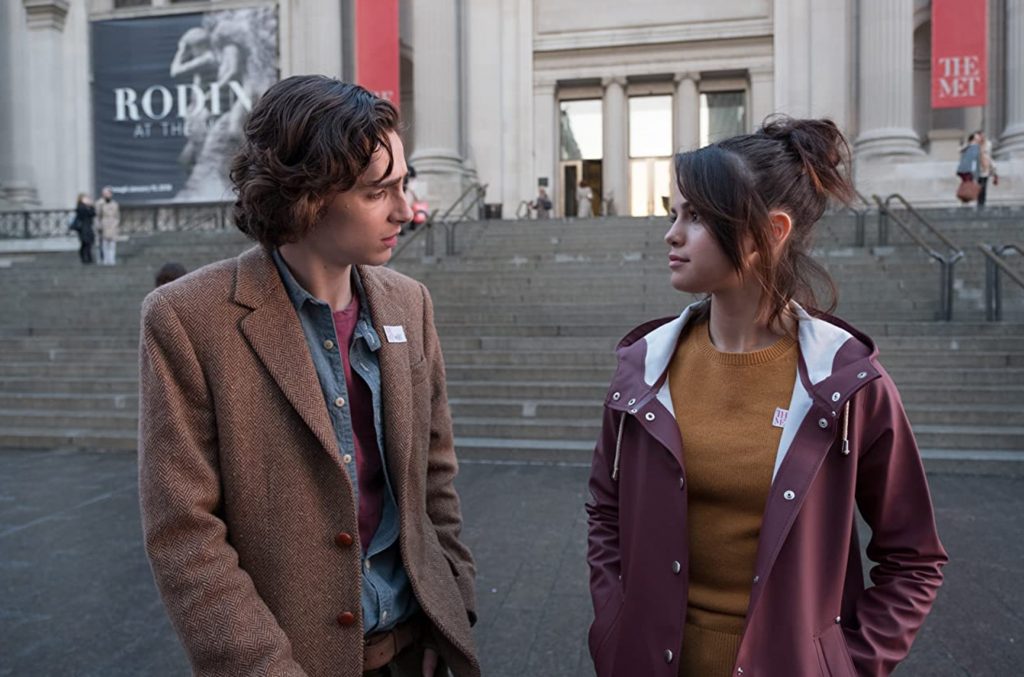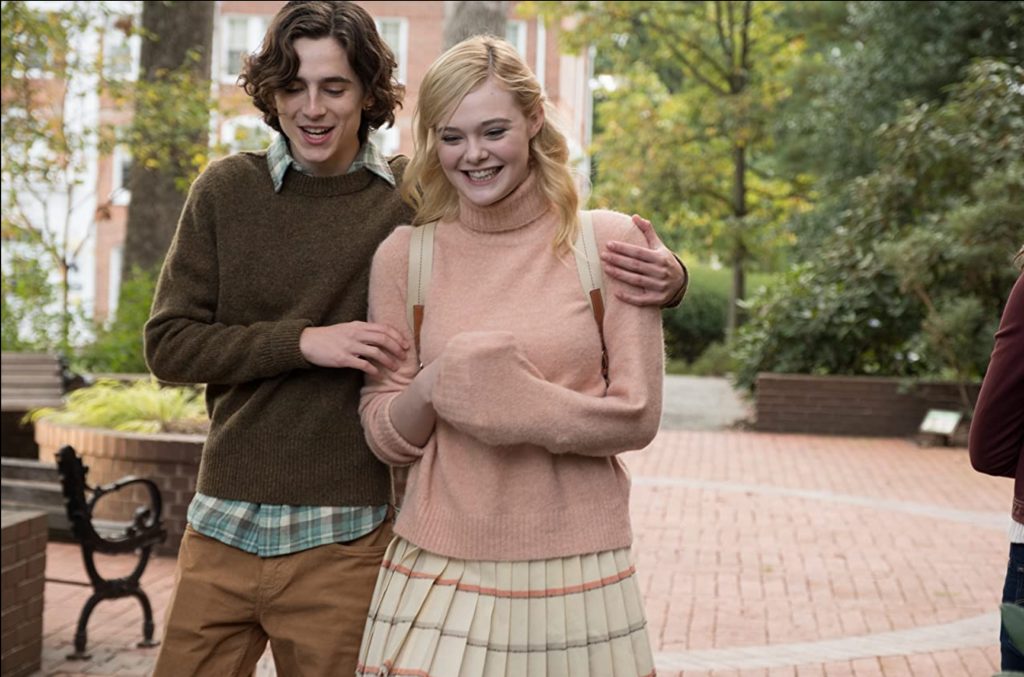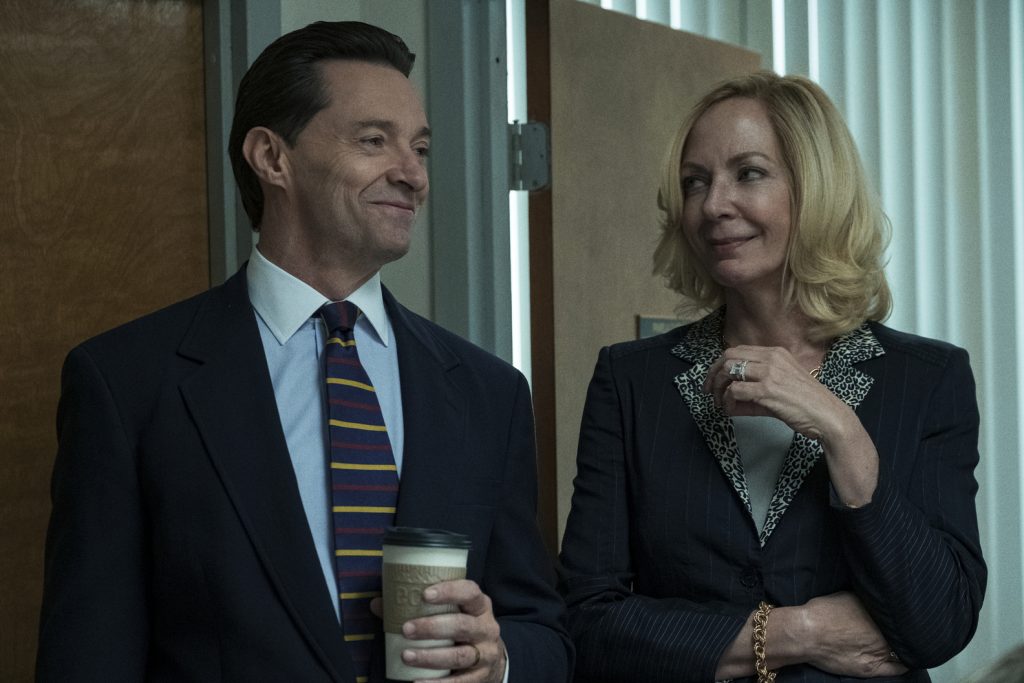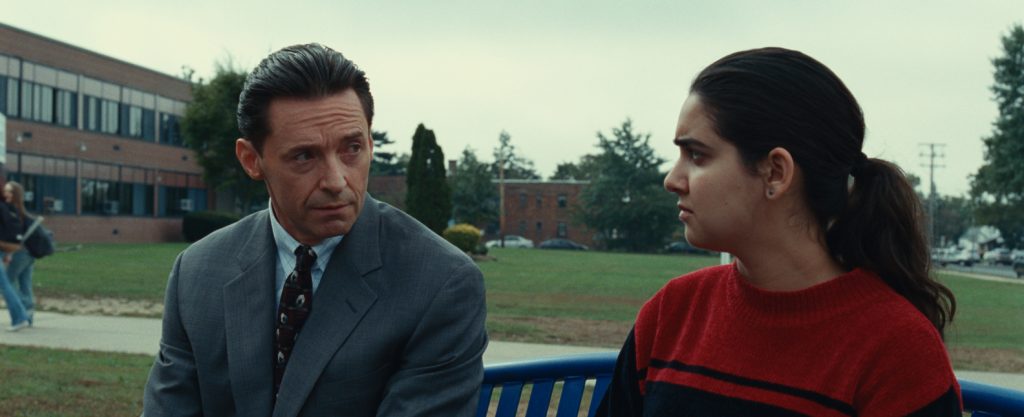November 5, 2020
by Carla Hay

Directed by Woody Allen
Culture Representation: Taking place in New York City and in upstate New York, the romantic comedy “A Rainy Day in New York” features a predominantly white cast of characters (with a few Latinos) representing the upper-middle-class and wealthy.
Culture Clash: A college student and his schoolmate girlfriend spend the day in New York City and experience unexpected entanglements with other people.
Culture Audience: “A Rainy Day in New York” will appeal primarily to die-hard fans of writer/director Woody Allen and star Timothée Chalamet, because this movie is clearly not their best work.

“A Rainy Day in New York” is writer/director Woody Allen’s very misguided attempt at making a teenage romantic comedy, but the results are as phony and pretentious as many of the characters in the film. Movie aficionados who are familiar with Allen’s work already know that he sticks to certain formulas and themes in his movies. His movies are usually about privileged people in a big city who are preoccupied with their spouses or lovers cheating on them. There’s usually at least one much-older man in the story who makes sexual advances toward a much-younger woman—or the older man at least makes it known that he’s sexually attracted to her. And there’s always jazz in the soundtrack because Allen is a big fan of jazz music.
And even though Allen’s movies usually take place in the racially diverse city of New York, he excludes African Americans and Asians from being in his films in any significant speaking roles. Occasionally, as he did in “A Rainy Day in New York” and in “Vicky Cristina Barcelona,” he might have a few Latinos in his films. The elitist and pseudo-intellectual worlds that Allen has in his movies are usually filled with people whining about personal problems that they create for themselves because they are addicted to self-sabotage.
You don’t have to see the poster for “A Rainy Day in New York” to know exactly who’s going to end up together by the end of the story. But until viewers get to that point, they have to sit through about 92 minutes of college-age people in their late teens and early 20s talking as if they’re about 10 years older, with very affected mannerisms. Unfortunately, much of the movie’s screenplay sounds exactly like what it is: dialogue written for young people by a senior citizen who doesn’t know how today’s young people really talk. Even though these young people are supposed to be privileged and well-educated, they still sound like an old person wrote their words for them.
All of the actors in “A Rainy Day in New York” are very talented, but they perform in this movie as if they’re all too self-aware that they’re in one of Allen’s films. And so, they all act is if they’re trying to conjure up the same neuroses and quirks of characters that were in classic Allen films, such as 1977’s “Annie Hall” and 1986’s “Hannah and Her Sisters,” which are considered two of Allen’s best movies.
“A Rainy Day in New York” follows the usual Allen formula of having the male lead character act like how a young Woody Allen would act, by being neurotic and showing some kind of intellectual snobbery. In this case, Timothée Chalamet plays the Allen surrogate with a character whose name is as pompous as his personality: Gatsby Welles.
Gatsby sees himself as quite the rebel because he dropped out of an unnamed prestigious university (presumably an Ivy League university) and is now enrolled in a small liberal-arts college in upstate New York called Yardley College. He likes to sneak off on a semi-regular basis to gamble with older men of dubious occupations. In reality, Gatsby isn’t that rebellious. He’s spoiled, a bit wimpy, and way too impressed with himself for someone who really hasn’t accomplished much and doesn’t know what he wants to do with his life.
Viewers can immediately see how self-absorbed Gatsby can be, but there’s no subtlety at all in this film. Allen over-amplifies Gatsby’s personality because he makes Gatsby have a constant stream of voiceover narration every time Gatsby is on screen. Other characters talk out loud to themselves when they wouldn’t need to do that if Allen trusted the actors enough to express emotions with their faces and body language.
In the opening scene, which takes place on the Yardley campus, Gatsby says in a voiceover: “This is Yardley, which is supposed to be a very good liberal college, which is supposed to be tony enough for my mother, which is total bullshit, because you get ticks [from] walking in the grass.” Gatsby further comments about his mother: “She says I have a high IQ and I’m not living up to my potential, even though last weekend I made 20 grand playing poker.”
Viewers will hear quite a bit about Gatsby’s domineering mother, because Gatsby can’t stop talking about her, even as he tries to avoid her. Gatsby’s parents (played by Cherry Jones and Jonathan Hogan) don’t have names in the movie, but viewers soon learn that Gatsby’s parents and his older brother Hunter (played by Will Rogers) live in New York City. Gatsby’s mother is a high-society influencer who’s presenting her big annual charity gala that Gatsby desperately does not want to attend.
There’s a scene in the last third of “A Rainy Day in New York” where Gatsby and his mother have a heart-to-heart talk, and it’s the best scene in the movie. Jones is fantastic in this role. Her performance is one of the few highlights of this meandering and often-dull film that recycles a lot of the same love-life problems and dilemmas that have been in other films by Allen.
Gatsby has a girlfriend named Ashleigh Enright (played by Elle Fanning), who also attends Yardley. On paper, Gatsby and Ashleigh both seem like a great match for each other. They both come from well-to-do families (Ashleigh’s father owns several banks in Arizona) that are politically conservative and white Anglo-Saxon Protestant. Gatsby and Ashleigh are both very intelligent and curious. However, Ashleigh tends to be very giggly, forthright and effervescent, which is in contrast to Gatsby’s more brooding, secretive and angst-filled personality. Ashleigh is a movie buff, while Gatsby is more of a literature enthusiast.
Gatsby and Ashleigh have been dating each other for a few months. He says in a voiceover that he’s in love with Ashleigh and she’s perfect for him. Gatsby also says that Ashleigh is the type of girlfriend his mother would approve of, which is why he plans to introduce Ashleigh to his mother for the first time at the big gala event.
It just so happens that Ashleigh, who’s a journalist for the Yardley student newspaper, has landed an interview with a famous New York City-based film director named Roland Pollard (played by Liev Schreiber), and she couldn’t be more ecstatic about it because she’s been a longtime fan of his. Ashleigh tells Gatsby that she’s going to New York City to interview Roland, so Gatsby decides the time is right to go to the city for a couple of days with Ashleigh and make a romantic trip out of it.
Gatsby takes charge of their trip. He tells Ashleigh that they’ll be staying at the Pierre Hotel, and he’s made plans for them to have dinner at Daniel, an exclusive, five-star French restaurant. It’s implied that Gatsby is so well-connected that he can easily get reservations at Daniel, which is a restaurant that’s known to take reservations weeks in advance. Gatsby also wants to possibly stay at the Carlyle Hotel, or at least have lunch there, during the trip.
Ashleigh’s meeting with Roland isn’t really an interview as much as it is a talk session where she nervously gushes over him like a fangirl. Based on how Roland’s movies are described, he’s an “auteur” who prefers to direct creatively challenging films instead of crowd-pleasing blockbusters. Roland is flattered that this young reporter knows a lot of about his work, but he’s wracked with insecurities about his latest film. He also mentions to Ashleigh that his ex-wife’s name was Ashley and she also went to Yardley.
Because Ashleigh is so nervous around Roland, she starts babbling some “too much information” personal details to him. For example, she tells him that she starts to hiccup when she’s anxious. “When I’m sexually anxious, I’ll hiccup indefinitely,” she adds. And, of course, that’s a signal that this nervous tick will definitely happen later in the film.
Ashleigh is such a neophyte journalist that when Roland tells her that he’d like to give her a scoop, she naïvely asks, “A scoop of what?” When Roland explains that a “scoop” is a journalist term for exclusive information, she can’t believe her luck that he chose her. Roland says that the “scoop” he wants to give Ashleigh is that he’s not happy with the film he’s working on, and it might be the last film he directs because he’s thinking of quitting the movie business.
Ashleigh is shocked and tells Roland that he shouldn’t quit. Roland invites Ashleigh to go with him to a private screening room to watch a rough cut of the film and to tell him what she thinks of the movie. The only problem for Ashleigh is that the time it would take to watch the movie would conflict with the lunch date that she made with Gatsby.
The offer from Roland is too good to pass up, so Ashleigh apologetically cancels her lunch date with Gatsby and explains why. Gatsby is disappointed, but he understands why Ashleigh wants this opportunity to get a great interview with one of her idols. And so, Gatsby and Ashleigh make plans to meet up later.
Gatsby now has unexpectedly a few spare hours of time where he’s free to do what he wants. He wanders outside the hotel and happens to see a former classmate from high school: a gossipy jerk named Alvin Troller (played by Ben Warheit), who is an elitist snob yet he has no manners. Gatsby isn’t too enthusiastic about seeing Alvin, but they make some small talk where they give updates on what they’ve been doing with their lives and why Gatsby is visiting in the city. Alvin tactlessly insults Gatsby and some other mutual acquaintances who are mentioned in the conversation.
Alvin tells Gatsby that a mutual former classmate from high school is directing a student film outside on a nearby street and that Gatsby should check out what’s going on with this movie if he’s curious. Before they part ways, Alvin tells Gatsby that if he were Gatsby, he’d be nervous about having his girlfriend alone in a room with a powerful movie director. It plants a seed of doubt in Gatsby about what might happen during the interview with Ashleigh and Roland.
When Gatsby arrives on the film set, the former classmate, whose name is Josh (played by Griffin Newman), is happy to see him. Josh convinces a reluctant Gatsby to make a cameo in the movie. Gatsby doesn’t feel comfortable about being in the movie because he tells Josh that he’s not an actor, but Gatsby agrees to the role only because it won’t take long and he won’t have to say any lines. All Gatsby has to do in the scene is kiss a young woman in a car.
And who is this young woman? Her name is Chan (played by Selena Gomez), and she happens to be the younger sister of Gatsby’s ex-girlfriend named Amy, whom Gatsby briefly dated when he was 16. Chan, who is a student at the Fashion Institute of Technology, is dryly sarcastic and comes from the same well-to-do type of family that Gatsby has. Before Gatsby and Chan start filming their kissing scene, Gatsby and Chan exchange the kind of teasing banter that makes it obvious that they’re thinking, “I’m attracted to you but I’m not going to admit it.” And you know what that means for a romantic comedy like this one.
Gatsby and Chan’s kissing in the scene starts off being very awkward. But then, eventually Gatsby and Chan become more relaxed with each other before the director tells them that he has the footage that he wants. Gatsby and Chan go their separate ways. But what do you know, they happen to see each other again when it starts raining and they both end up hailing the same taxi for their second “meet cute” moment. Gatsby and Chan decide to share the taxi ride, and then they have more banter filled with sexual tension.
During their conversations, Gatsby tells Chan that he’s in New York City with his girlfriend Ashleigh because Ashleigh is interviewing Roland Pollard for the Yardley student newspaper. Gatsby somewhat brags about Ashleigh coming from a wealthy family, but Chan shows some East Coast snobbery when she hears that Ashleigh and her family are originally from Arizona. Chan then proceeds to mock Ashleigh, whom she hasn’t even met, with jokes that imply that Chan thinks Ashleigh is an unsophisticated hick, even if Ashleigh’s family is rich.
It should come as no surprise that for the rest of the day, Chan and Gatsby find themselves spending time together, while Ashleigh gets more caught up in hanging out with Roland and his associates. Various hijinks ensue as Gatsby and Ashleigh make plans to meet up multiple times, only to have those plans changed because of a variety of circumstances. It’s all very predictable and formulaic because people who’ve seen enough romantic comedies know exactly what’s going to happen at the end of this movie.
At the screening room to watch the rough cut of Roland’s latest movie, Ashleigh meets Ted Davidoff (played by Jude Law), the screenwriter of the movie. Roland gets so distraught by what he sees in the rough cut that he storms off. Ted and Ashleigh take off in Ted’s car to try and find Roland. During this hunt for Roland, Ted sees his wife Connie (played by Rebecca Hall), who appears to be on a date with Ted’s best friend Larry Lipshitz. Connie told Ted that she was going to be hanging out with one of her female friends, and now Connie has been caught in a lie.
And so, Ashleigh finds herself tagging along and observing some of this marital drama, as Ted tries to find out if Connie is cheating on him or not. And speaking of infidelity, Ashleigh gets caught up in a situation where she has to decide if she’s going to be faithful to Gatsby or not. During the search for Roland, Ashleigh goes to Kaufman Astoria Studios in Queens, where she meets and is immediately dazzled by a sex-symbol movie star named Francisco Vega (played by Diego Luna), who’s almost twice the age of Ashleigh.
Francisco, who is in Roland’s latest film, doesn’t waste time in asking Ashleigh out on a dinner date. Francisco says he’s recently broken up with his actress girlfriend Tiffany (played by Suki Waterhouse), and when he and Ashleigh go outside together, they’re surrounded by paparazzi and news cameras. You don’t have to be psychic to know who will eventually see this footage.
During the time that Gatsby and Ashleigh are apart, there’s a minor subplot of Gatsby visiting his older brother Hunter and Hunter’s fiancée Lily (played by Annaleigh Ashford) in their spacious home. The wedding invitations have already been sent out, but Hunter confides in Gatsby that he doesn’t want to marry Lily. Why? Because Hunter says he doesn’t like Lily’s laugh, which Hunter describes as “a cross between Dad’s sister Betty and Lenny from ‘Of Mice and Men.'”
It’s yet one of numerous examples of how superficial, status-conscious and image-obsessed so many people are in this story. And it’s why this so-called romantic comedy isn’t very romantic when almost everyone in the story does not seem capable of loving anyone but themselves. Anyone who doesn’t meet their standard of wealth just isn’t worthy enough of their time.
Chalamet and Fanning do their best to bring some relatable humanity to their roles. But Gatsby is just too conceited and Ashleigh is just too fickle to go beyond the “spoiled rich kid” caricatures that writer/director Allen has constructed for them. Gomez doesn’t have much to do with the character of Chan, whose personality is just an empty shell that only exists to lobby semi-insults back and forth with Gatsby as they pretend they’re not attracted to each other. A good romantic comedy will have audiences rooting for the protagonists, but most of the characters in “A Rainy Day in New York” are so insufferable that audiences will wish these people would just shut up and go away.
MPI Media Group and Signature Entertainment released “A Rainy Day in New York” in select U.S. cinemas on October 9, 2020. The movie’s digital, Blu-ray and DVD release date is November 10, 2020. “A Rainy Day in New York” was released in several countries outside the U.S. in 2019.


